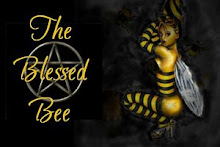Founded in 1962, and legally incorporated in 1968, CAW has a good claim on being the oldest legally incorporated Neo-Pagan organization in American. Taking much of its early inspiration from Robert A. Heinlein's 1961 science fiction novel, Stranger in a Strange Land, CAW now sees its mission as evolving a network of information, mythology, and experience to awaken the divine within and to provide a context and stimulus for reawakening Gaia, and to create a tribal community that will be dedicated to the responsible stewardship of the Earth and evolution of consciousness.
The Church of All Worlds is dedicated to healing the separation between mind and body, men and women, civilization and Nature, Heaven and Earth. It presents public rituals, festivals, and other events, and there are more than fifty local CAW chapters or "nests". It also publishes Green Egg, runs a teaching branch, Lifeways, and ecology branch, Forever Forests, and a research branch, The Ecosophical Research Association, which investigates myth and legend and how they relate to today's world.
2.20.2009
Pagan Pathways: Church of All Worlds
Posted by The Blessed Bee at 6:51:00 AM 0 comments
Labels: Church of All Worlds, information, magic, Neo-Pagan, New Age, Pagan, Pagan Paths, wicca, Wiccan traditions, witchcraft
Pagan Pathways: Ceremonial Magick
Followers of this Tradition uses a great deal of ceremonial magick in their practices. Detailed rituals with a flavor of Egyptian magick are sometimes a favorite, or they may use the Quabbalistic magick
Posted by The Blessed Bee at 6:50:00 AM 0 comments
Labels: Ceremonial Magick, information, magic, Neo-Pagan, New Age, Pagan, Pagan Paths, wicca, witchcraft
Pagan Pathways: Celtic Traditionalism
This may not be a familiar term to many people, it consists of trying to reconstruct the beliefs and practices of the original Celtic people, as opposed to Druidic learnings, this tradition focuses more on the beliefs of the average Celtic man or woman.
Posted by The Blessed Bee at 6:49:00 AM 0 comments
Labels: Celtic Traditionalism, information, magic, Neo-Pagan, New Age, Pagan, Pagan Paths, wicca, witchcraft
Pagan Pathways: Asatru
Some Odinists consider themselves to be Ásatrú, while others do not, nor are all Ásatrúar Odinists. Ásatrú is a polytheistic religion and the gods and/or goddesses that one chooses to worship or dedicate to among the Elder gods is a matter of individual choice and conscience. Odinism is included in the presentation of Ásatrú although not considered to be exactly the same thing.
Heathen is another term that you will come across and refers to religious groups which are based on Northern European pre-Christian Pagan beliefs while Paganism is an even more general term.
Asatru is the modern rebirth of the pre-Christian indigenous faith of the Norse peoples -- the ancestors of the Norwegians, Danes, Swedes, and Icelanders. This faith honored many Gods and Godesses, some of whose names are still familiar to us today, such as Thor, Odin and Freyja. The indigenous faith of Scandinavia, upon which Asatru is based, fell into shadow after the year 1100, with the advent of Christianity in Northern Europe.
The modern Asatru faith practiced by Gladsheim is part of a revival which began in 1973, when the Asatru Free Assembly was founded in the United States. The same year, Asatru was granted official recognition in Iceland, becoming the second recognized faith in that country, alongside the Lutheran Church.
Posted by The Blessed Bee at 6:45:00 AM 0 comments
Labels: Asatru, information, magic, Neo-Pagan, New Age, Pagan, Pagan Paths, wicca, witchcraft
Wiccan Traditions: Wiccan Shamanism
Wiccan Shamanism was founded by Selena Fox in the 1980's. Ecumenical and multicultural focus. Combination of Wicca, humanistic psychology and a variety of shamanistic practices from around the world. Emphasis on healing. Uses traditional shamanistic techniques to change consciousness, such as drumming and ecstatic dancing.
Posted by The Blessed Bee at 6:42:00 AM 0 comments
Labels: information, magic, Neo-Pagan, New Age, Pagan, wicca, Wiccan traditions, witchcraft
Wiccan Traditions: Welsh Witchcraft
Welsh Witchcraft is a broad umbrella term for those who worship the old Welsh deities and practice Faerie magick. The largest association of Welsh traditions in the US (and probably in the world) is the Association of the Cymry. Some of the member covens are Wiccan, some are not. Most notably, the Church of Y Tylwyth Teg (the founding group of Cymry) is a legally incorporated Church based in Georgia which teaches Welsh Witchcraft as an ecstatic, mostly shamanic tradition and works heavily with the Faerie realms.
Posted by The Blessed Bee at 6:40:00 AM 0 comments
Labels: information, magic, Neo-Pagan, New Age, Pagan, traditions, Welsh Witchcraft, wicca, Wiccan traditions, witchcraft
Wiccan Traditions: Stregheria
Stregheria is the form of witchcraft native to Italy; there are several distinct traditions sharing common roots in various parts of Italy. Also called "La Vecchia Religione," Stregheria is a nature-based religion. It's followers worship the forces of Nature, personified by gods and goddesses.
The witches of La Vecchia Religione are called Streghe (plural), with the title Strega (for a female) and Stregone (for a male).
Stregheria is rooted in the folk religion of the Latins (the Romans being one Latin people) and the Etruscans.
In the Aradian tradition, taught by Raven Grimassi in Ways of the Strega, the pantheon is different from the urban gods of the Romans, though some of those deities were shared with the Latins and the Etruscans. The most notable is Diana, whose worship was focused at a temple at Lake Nemi in the Alban Hills.
There are also other traditions of Stregheria in Italy, who may worship the urban gods of the Romans.
Posted by The Blessed Bee at 6:38:00 AM 0 comments
Labels: information, Italian Witchcraft, magic, Neo-Pagan, New Age, Pagan, Stregheria, traditions, wicca, Wiccan traditions, witchcraft
Wiccan Traditions: Stregheria
Stregheria is the form of witchcraft native to Italy; there are several distinct traditions sharing common roots in various parts of Italy. Also called "La Vecchia Religione," Stregheria is a nature-based religion. It's followers worship the forces of Nature, personified by gods and goddesses.
The witches of La Vecchia Religione are called Streghe (plural), with the title Strega (for a female) and Stregone (for a male).
Stregheria is rooted in the folk religion of the Latins (the Romans being one Latin people) and the Etruscans.
In the Aradian tradition, taught by Raven Grimassi in Ways of the Strega, the pantheon is different from the urban gods of the Romans, though some of those deities were shared with the Latins and the Etruscans. The most notable is Diana, whose worship was focused at a temple at Lake Nemi in the Alban Hills.
There are also other traditions of Stregheria in Italy, who may worship the urban gods of the Romans.
Posted by The Blessed Bee at 6:38:00 AM 0 comments
Labels: information, Italian Witchcraft, magic, Neo-Pagan, New Age, Pagan, Stregheria, traditions, wicca, Wiccan traditions, witchcraft
Wiccan Traditions: Shamanic Witchcraft
This term refers to practices associated with those of tribal shamans in traditional Pagan cultures throughout the world. A shaman combines the roles of healer, priest(ess), diviner, magician, teacher and spirit guide, utilizing altered states of consciousness to produce and control psychic phenomena and travel to and from the spirit realm.
Followers of this path believe that historical Witchcraft was the shamanic practice of European Pagans; and Medieval Witches actually functioned more as village shamans than as priests and priestesses of the "Old Religion."
Shamanic Witchcraft emphasizes serving the wider community through rituals, herbalism, spellcraft, healings, counseling, rites of passage, handfastings, Mystery initiations, etc.
The distinguishing element of Shamanic Witchcraft is the knowledge and sacramental use of psychotropic plants to effect transitions between worlds. The theory and practice of Shamanic Witchcraft has permeated widely though out many other established Traditions.
Posted by The Blessed Bee at 6:36:00 AM 0 comments
Labels: information, magic, Neo-Pagan, New Age, Pagan, psychotropic plants, Shamanic Witchcraft, shamanism, traditions, wicca, Wiccan traditions, witchcraft
Wiccan Traditions: Seax-Wicca
Founded by Raymond Buckland in 1973 and based on Saxon traditions and mythology. Covens are led by a Priest and Priestess and may determine for themselves whether to work robed or skyclad. Rituals are open, and decisions are made democratically.
Posted by The Blessed Bee at 12:31:00 AM 0 comments
Labels: information, magic, Neo-Pagan, New Age, Pagan, Saxon, Seax-Wicca, traditions, wicca, Wiccan traditions, witchcraft
Wiccan Traditions: Minoan Sisterhood
The Sisterhood was founded by Lady Miw in Manhattan during the mid-1970's. Unlike its counterpart, the Brotherhood, the Sisterhood is not for homosexuals only. Covens are female-only, however. This Tradition claims newly acclaimed author Phyllis Curott as one its initiates.
Posted by The Blessed Bee at 12:29:00 AM 0 comments
Labels: information, magic, Minoan Sisterhood, Neo-Pagan, New Age, Pagan, traditions, wicca, Wiccan traditions, witchcraft
Wiccan Traditions: Minoan Brotherhood
A Gay Men's tradition of Wicca established in New York by the late Lord Gwydion (Eddie Buczynski) in the mid - 1970's, at the same time as the Minoan Sisterhood was being established by Lady Miw, also in New York.
The Brotherhood remains exclusively a venue for Gay men to explore a traditional ritual Wicca, one which can foster a similar, though Gay, sexual mysticism and sense of personal empowerment as in some British traditions of Wicca.
As the founder was a Gardnerian initiate, the rituals are roughly Gardnerian, with changes to accommodate a different core mythology and ritual custom. Imagery and deities are those of Ancient Crete and Mycenae. Working tools and their uses are virtually identical to those of British traditional Wicca.
Posted by The Blessed Bee at 12:27:00 AM 0 comments
Labels: British Traditional Wicca, gay/lesbian, information, magic, Minoan Brotherhood, Neo-Pagan, New Age, Pagan, traditions, wicca, Wiccan traditions, witchcraft








